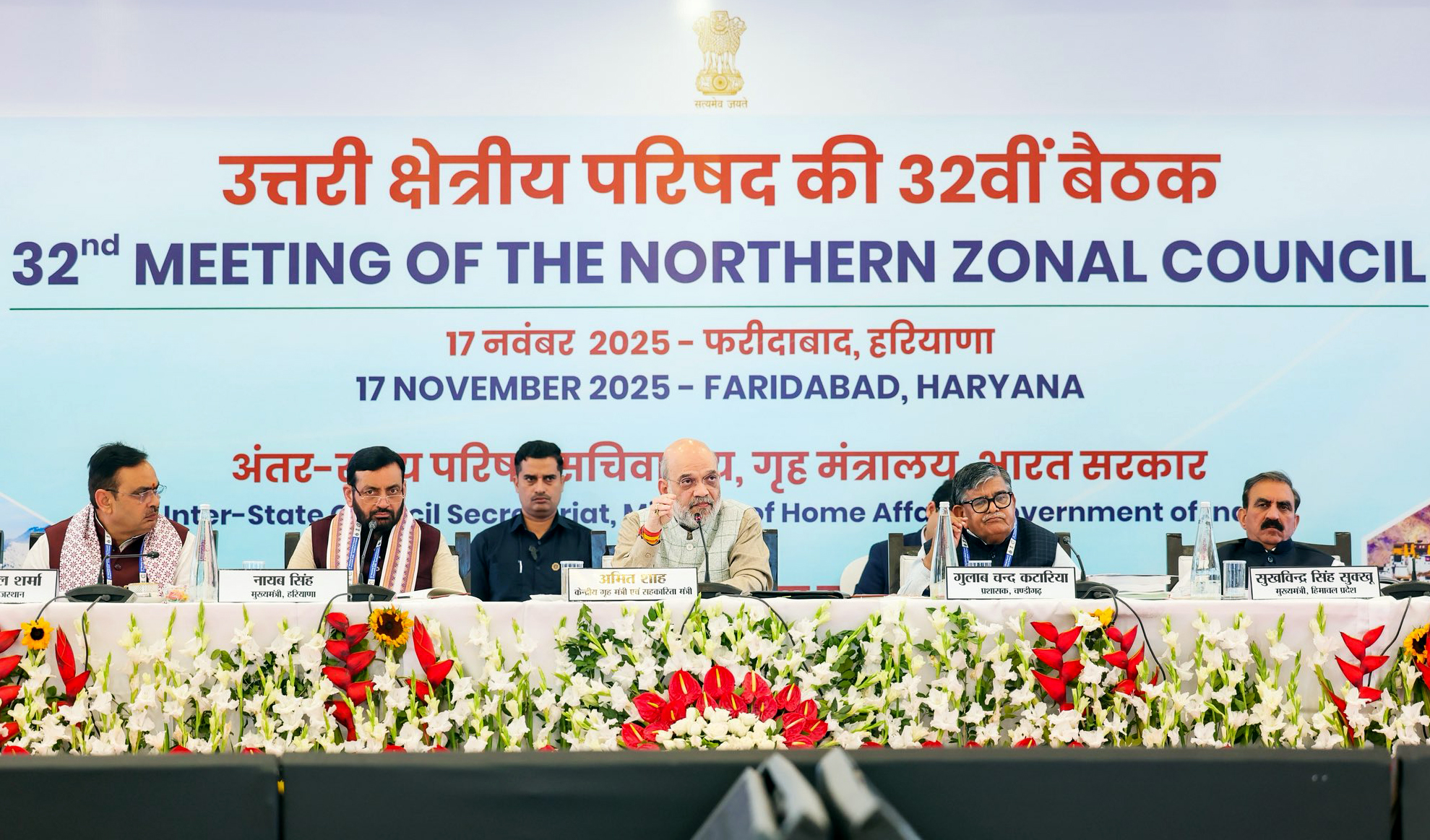Union Home Minister Amit Shah chaired the 32nd meeting of the Northern Zonal Council (NZC) in Faridabad, Haryana, on Monday. At the outset, the meeting observed a two-minute silence to pay tribute to those who lost their lives in the recent car bomb blast in Delhi and the explosion at Nowgam Police Station in Jammu and Kashmir.
Speaking at the meeting, Amit Shah reaffirmed that eliminating terrorism from its roots remains a collective national commitment under the leadership of Prime Minister Narendra Modi. He said that the perpetrators of the Delhi blast “will be traced even from the netherworld, brought before the country’s judicial system and given the strictest possible punishment.”
The Home Minister said Prime Minister Narendra Modi’s vision is that strong states create a strong nation, and the Zonal Councils play a crucial role in turning this vision into reality. “Zonal Councils are extremely important for dialogue, cooperation, coordination and policy synergy,” he stated. He also stressed the need for speedy justice in crimes against women and children and called for an increased number of Fast Track Special Courts to ensure timely disposal of cases under the POCSO Act. “No civilized society can accept such heinous crimes. Safety of women and children is our top priority,” he said.
Highlighting the potential of the cooperative sector, agriculture and fisheries, the Union Home Minister said these sectors can become key contributors in eradicating poverty and generating employment. He noted that development must reflect in the upliftment of every individual. “GDP alone is not an indicator of prosperity. True prosperity is achieved only when every individual rises above the poverty line,” he said, adding that the Ministry of Cooperation has initiated 57 measures to strengthen the sector, including the computerisation of Primary Agricultural Credit Societies and establishment of new national-level cooperative bodies.
Shah said the role of Zonal Councils has transformed in the last decade from advisory forums to action-oriented platforms. The number of Council meetings has gone up by nearly two-and-a-half times compared to the 2004–2014 period. He informed that 1600 issues were discussed across these meetings since 2014, out of which 1303 issues have been resolved. “More than doubling the number of meetings reflects Prime Minister Modi’s concept of TEAM Bharat,” he said.
The Home Minister also referred to the 150th anniversary of the composition of Vande Mataram and appealed to states and union territories to rekindle patriotism among the youth through the iconic song. “This was once the clarion call of the freedom struggle. Together, we must make it the call for building a Great India,” he said.
On the implementation of the new criminal laws, Shah said they have yielded “very positive results,” leading to a rise of around 25 to 40 percent in conviction rates. He urged state governments to further upgrade technology in policing, forensic systems and courts to strengthen delivery of justice.
Appreciating Rajasthan’s contribution to promoting millets, he encouraged all states to boost millet cultivation and include them in the monthly scheme of providing free food grains. This, he said, would improve public health and support farmers.
The meeting discussed several issues linked to member states, including water sharing, environment, higher education, the Emergency Response Support System (ERSS-112), and expanding brick-and-mortar banking services to cover every village. Six national priority areas also featured in the agenda, covering urban master planning, power infrastructure, strengthening PACSs, reducing school dropout rates, improving child nutrition through Poshan Abhiyan and wider participation of public hospitals in Ayushman Bharat-PMJAY.
Recalling the cultural legacy of Surajkund, Amit Shah said the region reflects India’s rich heritage and spiritual strength. He paid tribute to the Sikh Gurus for their sacrifice in defending faith and national honour, saying their contributions continue to guide the nation. “Had Guru Tegh Bahadur Ji not been there, the country would not be moving on the basis of its original traditions today,” he said.
The Home Minister said that through regional strength, national progress and India’s rising global leadership, the goal of creating a “Great India” will be achieved.














